
FROM THE EDITOR...
This year the AIZEN completed yet another stage of its mandate to move into new frontiers and extend research in the Americas. The three-day 12th International AIZEN Conference was held at the University of Texas at San Antonio, USA, opening up new areas of Zola and naturalist studies, in particular this author’s influence in the American Southwest, a region that fuses with the Latin world. This was the AIZEN’s first foray into the South, almost to the Mexican border. We discovered a city rich in historical lore, one that lies at the crossroads of many cultures, opening out onto Hispanic America.
 Jacques Dubois, Honored Guest Jacques Dubois, Honored Guest |
We were thrilled to welcome special guest Jacques Dubois, Professor Emeritus from the Université de Liège, Belgium, eminent Zola specialist and world-renowned sociologist of literature. Together with colleagues, he created Groupe Mu in the 1960s and laid the foundations for a new rhetoric. His nine books include L’Assommoir de Zola. Société, discours, idéologie (Larousse, 1973) and L’Institution de la littérature: introduction à une sociologie (Nathan, 1978). He most recently co-authored Les Romanciers du réel. De Balzac à Simenon (Seuil, 2002), and was responsible for the Pléiade edition of the complete works of Georges Simenon (2003). In his challenging paper, entitled “Zola, la fiction et les sciences humaines,” Professor Dubois put forth the idea that the sociological knowledge transmitted by Zola in a novel such as La Bête humaine requires specific forms of exploration on the part of the reader, since the analysis of society is not presented as it would be in a treatise. For that novel, Professor Dubois traced several lines of meaning/ knowledge, such as those related to exchange, psychoanalysis, and class, illustrating the depth of Zola’s unique insights into these areas. Participants appreciated Professor Dubois’ interventions during the sessions of the conference and were delighted to find themselves engaged in conversation with him and Mme Dubois during other more relaxed moments of the conference.
Entire panels were organized for this conference on topics that have never received such attention before. We thank Dr. Robert April, of the Mount Sinai School of Medicine in New York City, for creating a panel entitled “The Mystery and History of Hysteria: Zola, Charcot, Lourdes, and Beyond,” bringing together specialists in the fields of medicine and psychiatry able to comment on the medical content in Zola’s works. Dr. April solicited funds from the pharmaceutical company Pfizer to bring Toby Gelfand, a historian specializing in nineteenth-century medicine and the beginnings of psychiatry from the University of Ottawa, who gave a paper on the relations between Charcot and Zola, and Zvi Lothane, a psychoanalyst from the Mount Sinai School of Medicine, whose paper dealt with the nineteenth-century notion of “la grande hystérie” and its further evolution via Freud into the early twentieth century. Dorothy Diehl, from Saint Mary’s University of Minnesota, organized a panel entitled “Zola and Contemporary Pedagogical Thought: The Experimental Method in 2003,” which explored how naturalist works of literature can be used themselves as scientific experiments in the classroom, showing that the new technologies are completely in line with Zola’s fascination with novel approaches to literature. Jeanne Campbell Reesman, professor of English at the University of Texas in San Antonio, organized a panel entitled “Jack London and Naturalism,” in which an effort was made to delimit the specificity of this American writer’s naturalist tendencies. Juan Pablo Spicer-Escalante's panel, entitled "Naturalism in Film and the Media," focused on the Americas.
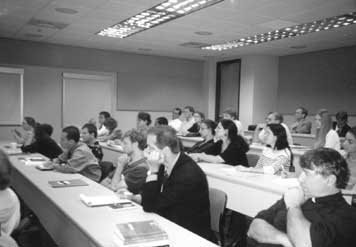 AIZEN Conference 2003 AIZEN Conference 2003 |
Topics covered for the sessions included new angles on familiar naturalist themes, such as representations of the feminine, gender and the body, Zola and the visual arts, theoretical approaches, and film adaptations of Zola’s novels. This time there were special sessions on Zola’s novels Germinal, Nana, and Le Rêve. A number of sessions centred on entirely new topics related to Zola and naturalism, such as serialization and mass production, animal representations, vampirism, horror and the macabre, and various ideologies that surface in naturalist texts, such as capitalism and Marxism. One session unique to this conference focussed on Mexican, Mexican-American, and Louisiana authors influenced by Zola, thereby bringing together multi-cultural texts from the South and moving the AIZEN closer to Latin America.
The Ninth Naturalist Film Festival in essence straddled the Mexican-American border with two silent films. Victor Sjöström’s classic film The Wind (1928, black and white, subtitles in English), has, as its setting, the Texas “Dust Bowl” region, at the turn of the century. It follows a young, socially disenfranchised woman from Virginia, played by Lillian Gish, who leaves her home and begins a new life on the desolate, wind-swept prairie. Naturalist metaphors abound in this narrative relating the woman’s successive failures against a backdrop of storms and an ever-present hot wind. The second film, Que Viva Mexico! (1932, black and white, subtitles in English), a masterpiece by Soviet director Sergei Eisenstein, features a politicized narrative of naturalist, class-based struggle, and even includes a view of the 1910 revolution. Eisenstein worked with Upton Sinclair on this production, a type of socio-historical chronicle revealing a part of Mexico tourists do not often see.
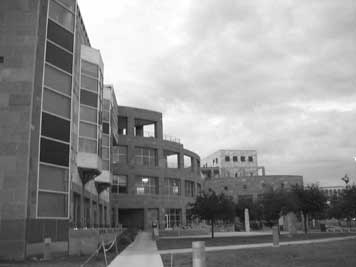 Downtown Campus, University of Texas in San Antonio Downtown Campus, University of Texas in San Antonio |
The social occasions at the conference repeated this Mexican theme. During a luncheon on the first day, at La Margarita Mexican Restaurant and Oyster Bar, participants savored local specialties, such as avocado salad, seafood enchiladas, and sopapilla, to the joyous sound of a mariachi band, in the fiesta-like atmosphere of the San Antonio Market Square. Amidst alternating mist and sun, conference-goers became mesmerized by the totally bi-lingual, bi-cultural atmosphere of San Antonio. This was evident even at the Radisson Hotel where participants could order huevos rancheros in Spanish for breakfast at the Café Chameleon and Mariachi singers and instrumentalists once again serenaded at the Opening Reception. On Saturday night, the group ventured into the Paséo del Rio area, where the town of San Antonio had its beginnings on the banks of the Yanaguana, as the Payaya Indians called it centuries ago. It is said that these Indians shared some fish with the first Spanish explorers on this location; now it is an ultra-fashionable spot for shopping, gourmet dining, and night-clubbing.
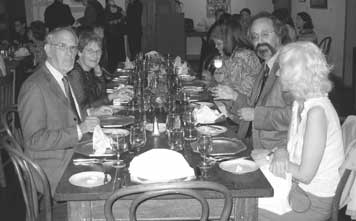 Naturalist Banquet at the Copper Kitchen Naturalist Banquet at the Copper Kitchen |
The Naturalist Dinner took place in the Copper Kitchen, the quaint cafeteria of the former Ursuline Academy and Convent in San Antonio, designed in 1851 by a French architect named François Giraud. Recorded in the National Register for Historic Places, the collection of buildings is a Texas landmark and part of it houses a campus of the Southwest School of Art and Craft. The Club Giraud has as its avowed purpose to preserve the historic buildings, which it occupies, and support the entire complex. The crumbling walls and decorative antiques of the Copper Kitchen provided an accent of authenticity to our gathering on that balmy evening in San Antonio. During this event Marion Geiger, of The Johns Hopkins University, USA, was presented with the Schor/Cahm Award for the Best Graduate Student Paper. In her text, entitled “L’envers d’Une Page d’amour d’Émile Zola,” she examined a poetics of pneumatics, showing how its incremental elaboration departs from the melodramatic label this novel has acquired. A number of young scholars who have previously received the Schor/Cahm Award were present to receive accolades for their recent accomplishments, such as completions of doctoral degrees and appointments to posts.
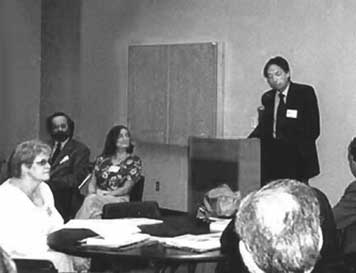 Denis Simonneau, Consul General of France in Houston Denis Simonneau, Consul General of France in Houston |
At the Texas conference, the AIZEN was favoured by the participation of the Consulate General of France in Houston. In his opening speech, Consul General Denis Simonneau emphasized the importance of Zola studies for the realization of multi-culturalism in the Western world. Cultural Attaché Joël Savary addressed banqueters during the Naturalist Dinner, praising the AIZEN for its promotion of French culture around the world, in its focus on Émile Zola. We are grateful to the Consulate General of France in Houston for its generosity and significant contribution to the success of the conference.
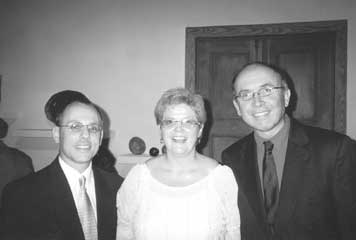 Left to Right: Daniel Gelo, Anna Gural-Migdal, and Joël Savary Left to Right: Daniel Gelo, Anna Gural-Migdal, and Joël Savary |
We offer a warm thank you to the College of Liberal and Fine Arts and its Dean Daniel Gelo for their warm reception and generous support. A special thank you goes to Jeanne Campbell Reesman for initiating the project of bringing the AIZEN to the San Antonio Campus of the University of Texas. We are grateful to the Department of Modern Languages and Literatures and the Department of English, Classics, and Philosophy for hosting the 12th International AIZEN Conference and to their Chairs at that time, Marita Nummikoski and Linda Woodson, respectively. Representatives of these departments who worked closely with us and deserve special thanks are Debbie López and Santiago Daydí-Tolson, the Local Organizers whose assistance and input have been invaluable. Organizers-in-Chief, Anna Gural-Migdal and Carolyn Snipes-Hoyt, and Co-Organizers Elizabeth Emery and Robert Singer have appreciated their enthusiasm and hard work.
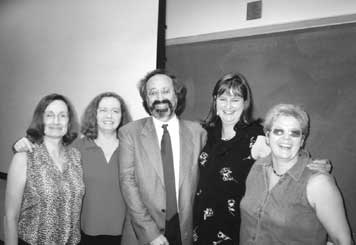 2003 Organizational Committee: Left to Right: Carolyn Snipes-Hoyt, Debbie López. Robert Singer, Jeanne Campbell Reesman, and Anna Gural-Migdal 2003 Organizational Committee: Left to Right: Carolyn Snipes-Hoyt, Debbie López. Robert Singer, Jeanne Campbell Reesman, and Anna Gural-Migdal |
At the close of the Conference, many found a moment to visit the Alamo, where we had time to contemplate the “Texas experience.” Starting out as a Franciscan mission, erected about 1722, the Alamo in present-day San Antonio was the site of the most heroic episode of the Texas war of independence. The San Antonio garrison of only 155 men found shelter in the mission and held out bravely for a time against a Mexican force of about 4000 under the command of Antonio López de Santa Anna, who was later to become president of Mexico. Of this heroic group of Texans, all perished in the hand-to-hand struggle that ended the stand-off, including the American frontiersmen Davy Crockett and James Bowie. At the subsequent battle of San Jacinto, when Santa Ana and his Mexican army were defeated, the battle cry of the Texans was “Remember the Alamo!”
The Alamo remains a symbol not only of independence, but also of a willingness to collaborate and sacrifice to achieve a common goal. A parallel can be drawn with the loyalty and devotion of AIZEN members to a project that has expanded over the years, taking on new facets and growing in directions that were not envisioned at the outset. You have proven ready to give generously of time and other resources for the sake of a vision that is larger than any one of our personal goals. We thank you for you invaluable contributions to the success of the AIZEN in its mandate of digging deeper and seeing things differently, in the areas of Zola studies and naturalism. Whatever happens in the future, “Remember the AIZEN!”
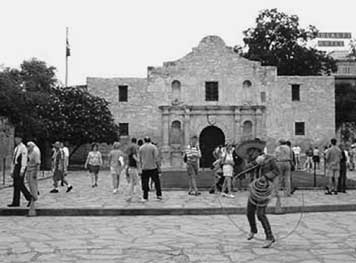 The Alamo, San Antonio The Alamo, San Antonio |
In 2004 our Association brings its 13th International Conference and 10th International Naturalist Film Festival to South America for the first time. The AIZEN is especially thrilled to celebrate an international Zola in Brazil, since his involvement in the Dreyfus Affair had an important impact in that country and his naturalism, in particular, has had a tremendous influence on writers where Portuguese is spoken. One of the major goals of the conference is to enable participants to discover these authors; the AIZEN seeks furthermore to blur national borders and disregard oceans, through the use of three languages: Portuguese, French and English.
For us it is a privilege to be here, in the most important Latin American country, a symbol itself of the harmonious mixing of cultures and races. We feel even more honored by our visit to Rio de Janeiro since we will find ourselves, for the four days of this conference, June 25 to 28, within the venerable walls of the Casa de Rui Barbosa, which have preserved the memory of more than a century of History, in particular, in tribute to the influential Brazilian lawyer Rui Barbosa who lived here. Like Zola, Barbosa fought against injustice and in the name of truth through the defense of Captain Alfred Dreyfus. For this reason, we would like to offer a warm thank you to the Casa de Rui Barbosa Foundation, its President José Almino de Alencar, and especially Rachel Teixeira Valença, director of its Research Center, for the wonderful welcome they have prepared.
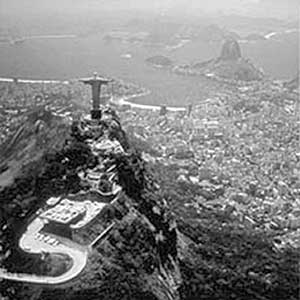 Cristo Redentor, Rio de Janeiro, Brazil Cristo Redentor, Rio de Janeiro, Brazil |
This conference would not have been possible without the invaluable collaboration of the Universidade Federale do Rio de Janeiro. We would like to express our profound gratitude to the Dean of the Faculdade de Letras, Edione Trindade de Azevedo, the Director of the Programa de Pós-Graduação em Letras Neolatinas of the Faculdade de Letras, Celina Moreira de Mello, and the Assistant Director of this same program, Flora de Paoli Faria. We are especially indebted to Ligia Vassallo and Pedro Paulo Catharina, colleagues in the Programa de Pós-Graduação em Letras Neolatinas de Faculdade de Letras at the Universidade Federal do Rio de Janeiro, who initiated the project of bringing the AIZEN to this city. They offered their collaboration, when we met four years ago at the University of Alberta, and their excitement about the project has never wavered. They have shown remarkable professionalism as they have worked with us on the organizational details throughout. We thank them for their efficiency, kindness, and generosity. As co-organizers with Anna Gural-Migdal, they have outdone themselves soliciting funding, taking control of the local arrangements, providing input into the invitation of guests, and overseeing the intellectual quality of the Portuguese-language component of the conference. Their working closely with representatives from the Universidade Federal do Rio de Janeiro and the Fundação Casa de Rui Barbosa, has been greatly appreciated.
Special thanks go to the Consulat Général de France in Rio de Janeiro and, in particular, to Jean-Paul Lefèvre, Attaché de Coopération et d’Action Culturelle, and Alain Saragosse, Attaché Linguistique, for their participation and generous support. Furthermore, we have been thrilled to learn of the interest shown for this event by Brazilian governmental and cultural institutions, such as the Casa de Rui Barbosa Foundation, the Cultural Section of the Faculdade of the Letras at the Universidade Federal do Rio de Janeiro, le CAPES, le CNPq, le FAPERJ, and even the Calouste Gulbenkian Foundation of Portugal, the Center for Comparative Studies at the University of Lisbon, and Albert-Ludwigs-Universität Freiburg, Germany.
Nearly ninety participants are expected from ten countries and three continents. We thank them for their contribution to the intellectual content and international character of the event. Significantly, specialists from all the major Brazilian universities will be present and we thank them for bringing their expertise to this exchange of research and ideas relating to Émile Zola and Naturalist Studies.
We are thrilled to welcome six invited guest speakers to our conference in Brazil. Four honored guests will cross the Atlantic Ocean, from Europe, to be with us; and our two special guests are renowned scholars of Zola and naturalism in Brazil. We will come to meet them in their own country. Honored guest Jean-Louis Cabanès, from the Université de Paris X-Nanterre, France, has broken new ground in the areas of literary realism and naturalism, in such works as Le Corps et la maladie dans les récits réalistes (1856-1893), 2 vols. (Klincksieck, 1991) and Le Roman. L’explosion d’un genre (Bréal, 2002), co-authored with Colette Becker. He is responsible for a number of editions, including one of Émile Zola’s Le Docteur Pascal, forthcoming with Poche classique. For the last four years, he has edited Les Cahiers Edmond et Jules de Goncourt, together with Pierre Dufief. Professor Cabanès will give two papers. His first presentation, entitled “L’écriture duelle dans Le Journal des Goncourts,” will take place at the Théâtre de la Maison de France (av. Pres. Antonio Carlos, 58/ Centro, Rio de Janeiro), Monday evening, May 24, at 5 p.m., during a pre-conference session, after which Professor Anna Gural-Migdal, from the University of Alberta, President of the AIZEN and Editor-in-Chief of Excavatio, will also give a paper, entitled “Le Germinal de Claude Berri, figures du souvenir et de la mort,” as an introduction to a screening of the film in the same theater. Professor Cabanès’ second paper, entitled “Le Docteur Pascal: roman éloquent, roman lyrique,” will be given on the first day of the conference, Tuesday, June 25, at 10:15 a.m. in the Auditorium, Casa de Rui Barbosa.
Honored guest Carlos Reis is a Professor of Portuguese Literature and Literary Theory at the Universidade de Coimbra, Portugal. He has published about twenty books. Professor Reis is the General Editor of the critical editions of the works of Eça de Queirós and the Histoire critique de la littérature portugaise (Editorial Verbo), and director of the review Discursos. Currently, he is also director of the National Library of Portugal. He will present a paper entitled “Eça de Queirós et le naturalisme, l’idée nouvelle et la cathédrale romantique,”on Thursday, May 27, at 11:15 a.m. in the Auditorium, Casa de Rui Barbosa.
Honored guest Joseph Jurt, from the Albert-Ludwigs-Universität Freiburg, Germany, has headed three major research projects since he was appointed as a professor there, in the areas of Reception of French Literature in Germany, Nation and Modernity, and the Construction of National Identity in Germany, France and England. In 1989, he began to work in close co-operation with Pierre Bourdieu at the “Centre de sociologie europeénne,” in Paris. This year Professor Jurt published a volume, entitled Absolute Pierre Bourdieu (Orange Press), where he brings together important essays by the now-deceased, world-renowned sociologist of literature, an interview with him, and introduces the collection in a critical essay. Professor Jurt will give a paper entitled, “Zola entre le champ littéraire et le champ artistique,” at 11:15 a.m. on Wednesday, May 26, in the Auditorium at the Casa de Rui Barbosa.
Honored guest Kelly Basilio is a Professor of French Literature and Culture and Comparative Literature in the Faculdade de Letras at the Universidade de Lisboa, Portugal. A specialist in the areas of Zola and naturalism, she published an important work for naturalist studies, Le Mécanique et le vivant. La métonymie chez Zola (Droz, 1993), and a critical guide for Au Bonheur des Dames (Nathan, 1991), among other works. She serves as the Portuguese correspondent for Les Cahiers naturalistes. Kelly Basilio will present her paper, entitled “Balzac vu par Zola ou le naturaliste malgré lui,” at 11:15 a.m., on Friday, May 28, in the Auditorium.
Special guest João Roberto Faria comes to us from the Universidade do São Paulo, Brazil, to share his expertise in Brazilian naturalist theater. He will give his talk, entitled “Zola et le naturalisme théâtral au Brésil,” at 2:00 p.m. on Thursday, May 27, in the Auditorium at the Casa de Rui Barbosa. And special guest Marcelo Bulhões, from the Universidade Estadual Paulista-Bauru, Brazil, will enlighten participants on the Brazilian naturalist novel. His presentation, entitled “O Erotismo no romance naturalista brasileiro” will take place at 2:00 p.m. on Wednesday, May 26, in the Auditorium, Casa de Rui Barbosa. A simultaneous translation into French will be provided.
Another specialist in Zola and naturalism, Gilbert Darbouze, Professor of Languages and Cultures at Bloomsburg University in Pennsylvania (USA), will make a presentation, based on his breaking research undertaken at the Bibliothèque nationale de France, revealing a correspondence between Brazilian writer João Marquès de Carvalho and Émile Zola. You will not want to miss this talk that will take place at 5:15 p.m., on Friday, June 28, in the Auditorium.
About thirty sessions appear on the program for this conference, promising a remarkable richness. For the first time, there will be sessions devoted to the influence of Zola in Portugal and Brazil, regarding the naturalist movement he inspired and the repercussions of his intervention in the Dreyfus Affair. We thank Elizabeth Emery for organizing a special Round Table, entitled “Using Technology to Foster International Exchange in the Classroom: Tips, Techniques, Resources,” that will enable specialists and students of naturalism in the entire world to connect through video-conferencing.
All conference sessions will take place in three rooms at the Casa de Rui Barbosa, Rua São Clemente, 134, Botafogo Rio de Janeiro, RJ CEP 22260-000 (Tel. 55-21-537-0036). Casa Rui Barbosa, the manor house where the famous Brazilian intellectual lived from 1895 to 1923, provides a fine example of nineteenth-century Brazilian urban architecture and is surrounded by a splendid garden. Since 1930 this magnificent edifice and its environs have been transformed into a museum, library, documentation center, and a foundation, with a new building to support its many activities at the far end of the grounds. The new building, designed by National Heritage architects to harmonize with the older buildings, houses the library, the documentation and research center, as well as the administration facilities for the Foundation, which is affiliated with the Brazilian Ministry of Culture. The newer building is where participants will find the “Auditorium” (an amphitheater, with seating for 280), the “Salle de cours” (a classroom, with seating for 45), and the temporary exhibition area. The third conference room, “La Salle Constituição” (the Constitution room, with a seating for 30), is actually a beautifully decorated and furnished alcove in the former manor house of Rui Barbosa.
Participants will easily make their way to the Casa de Rui Barbosa from the Hotel Royal Copacabana. They can take the metro at the “Sequiera Campos” station two blocks from the hotel and get off at the second station, called “Botafogo,” which exits onto Rua São Clemente, where the Casa de Rui Barbosa is located. The Auditorium, where the plenary and some other sessions will be held, is a magnificent, ultra-modern amphitheater for major events. It is equipped with a video projector and screen, a slide projector, air-conditioning, insulation providing exceptional acoustic quality, as well as carrels with headphones for simultaneous translation. The “Salle de cours,” a smaller classroom, is ultra-modern and air-conditioned, with insulated acoustics, and very comfortable over-stuffed armchair-style seating. It is equipped with individual tables for computers, overhead projector, video projector, and a system for showing data displayed on a laptop screen. If you are planning to use this latter, please provide your own IBM-compatible laptop computer. Participants are asked to refrain from taking pictures in the “Salle de Constituição,” since this space, with its period décor, will be converted temporarily into a conference room especially for the AIZEN.
During the day, you will want to have lunch at one of the restaurants near the Casa de Rui Barbosa. At Quilograma (rua São Clemente, 104/ te. 25 27 14 72) you will receive a 10% reduction upon presentation of your AIZEN badge at the cash register. This 21st-century, chic buffet-style restaurant is organized so that you serve yourself and pay for food according to its weight. Also on rua São Clemente, at 24, is O Bismarque. You may wish to go to Topázio (rua 19 de fevereiro, 165 /tel. 25 42 34 92), Moranga (rua Assunção, 153), Ekkos (rua Vicente de Souza, 25/ tel. 25 2703 88), or Churrascaria Estrela do Sul (praia de Batafogo, 490 / tel. 25 90 01 88), other restaurants in the vicinity.
The local organizers have arranged an extraordinary program of social and cultural activities. A special brunch has been planned for the opening day and has been generously offered by the Fundação de Casa de Rui Barbosa. This will take place in the garden on the grounds of the Casa de Rui Barbosa, at the entrance to the manor house. On the first evening, conference-goers are invited to attend a concert featuring Brazilian music for brass, performed by the ensemble “Art Metal Quinteto” (of the Academia Brasileira de Música) in the Auditorium, from 6:30 p.m. to 7:30 p.m.
Wednesday evening, from 6:15 p.m. to 7:30 p.m., the inauguration of a special exhibit created in honor of the AIZEN conference will be held at the Casa de Rui Barbosa, in the foyer of the Auditorium and the area adjoining, called the “Salon” of the main floor. Domicio Proença Filho, the invited curator and a Professor at the Universidade Federal Fluminense, will make a special presentation entitled “Machado de Assis e Emile Zola: un diálogo intertextual?” to introduce the exhibit, entitled “O Naturalismo na Literatura Brasileira”(Naturalism in Brazilian Literature). We also thank Rachel Teixeira Valença, the director of the Research Center, for her assistance in organizing this event, which will include a reception offered by the Faculdade de Letras, Universidade Federal do Rio de Janeiro. Another exhibit, “Rui Barbosa e o caso Dreyfus” (Rui Barbosa and the Dreyfus Affair), will be on display in the manor house for participants to enjoy, since there will be a launching for the second edition of the bilingual Uma voz contra a injustiça. Rui Barbosa e o caso Dreyfus/Une voix contre l’injustice. Rui Barbosa et l’affaire Dreyfus, by Homero Senna, which has recently been published by the Foundation.
The Naturalist Banquet will take place at Rio Othon Palace Hotel, Avenide Atlântica nº 3264 (at the corner of rua Xavier da Silveira nº 7), in Copacabana, from 8:00 p.m. to midnight, on May 27. The room, “Pátio tropical,” is on the 3rd floor and provides a spectacular view of the famous beach. From the Hotel Royalty (where rooms for participants have been booked), banqueters can walk to the Rio Othon Palace Hotel. However, the local organizers suggest that conference participants share taxis in groups of 3 or 4, since cabs are inexpensive in Rio. The cost for the Naturalist Banquet, with taxes and tip, is $40.00 US (R$120.00). This includes: a.) Hors d’oeuvre: gourmet avocado salad stuffed with tuna mousse; b.) Entrée: “Bobó de camarno,” a regional specialty consisting of a cassava purée with shrimp; c.) Main dish: filet mignon with green pepper, risotto parmigiano, glazed carrots; d.) Dessert: passion fruit cake, flavored with “pitanga”, a red fruit; e.) Drinks: mineral water, carbonated drinks, “batidas” and “caiprinha” (local drinks with a rum base and fruit juices); f.) After dinner: tea, coffee, petits fours (small iced-cakes), chocolate truffles. We thank you in advance for confirming your participation in this not-to-be-missed event by making payment in Brazilian currency for the Naturalist Banquet during conference registration, on May 25, before noon. The Schor/Cahm Award for the best graduate student paper will be presented during the evening.
This year’s film festival features two color films, to be presented in the auditorium at the Casa do Rui Barbosa, on the evenings of the 26th and the 28th of June. On Wednesday, at 7:30 p.m., El crimen del padre Amor, by Mexican filmmaker Carlos Carrera (2002, 118 minutes, English subtitles) will be shown in the Auditorium. By way of introduction to the film, Monica Figueiredo (Universidade Federal do Rio de Janiero) will give a paper entitled “El crimen del padre Amaro do romance português ao filme mexicano.” This film, a candidate for the Oscar for the best foreign film in 2003, is an adaptation of a Portuguese naturalist novel with the same title by Eça de Queirós. The filmmaker changed the setting of the action to Chiapas, Mexico, in order to criticize the collaboration between the higher clergy and drug traffickers in his own country. Its title is reminiscent of Zola’s La Faute de l’abbé Mouret, but viewers will notice as well a link to another Rougon-Macquart novel: La Conquête de Plassans. On Friday evening at 6:30 p.m., Madam Satã, a French-Brazilian film by Karim Aïnouz (2002, 105 minutes, subtitled in French) will be shown in the Auditorium. The film is inspired by the life of João Francisco dos Santos, alias Madame Satã, who is poor and homosexual. He was a cook in the 1930s, always getting into fights in the seediest parts of Lapa, in Rio de Janeiro. This was a period when Afro-Brazilian culture was just emerging. Our sincere thanks go to Sergio Pedrosa (Fundação Casa de Rui Barbosa), for the selection of these uniquely naturalist films and organizing the 10th International Naturalist Film Festival.
On Saturday, May 29, an excursion to the imperial city of Petrópolis, has been planned and will take the entire day. Brazilian Emperor Dom Pedro II built a palace in this beautiful location in the mountains above Rio de Janeiro in 1845, as a summer residence. He encouraged German settlers to come to work as tenant farmers and artisans. During the years that followed, the town prospered and many noble families moved to Petrópolis and built mansions or palaces there. This destination makes an interesting day trip from Rio, since it boasts cool temperatures, beautiful mountain scenery, and architectural wonders. Transportation will be provided on an air-conditioned Grey Line coach, which will collect our group at the Hotel Royalty early in the morning, between 8:00 and 8:30. The itinerary will be as follows: a.) Drive up the mountain and enjoy a magnificent panoramic view (about 60 minutes); b.) Visit the Imperial Museum with its jewels and royal splendor; c.) Take the city tour of Petrópolis, its cathedral, and the home of Santos Dumont, father of aviation and tireless inventor; d.) Return to Rio in the late afternoon. The cost to participants for this event will be $23.00US (R 70.00); lunch at a restaurant in Petrópolis is not included in this price. Please make payment for the excursion before noon on May 25, during conference registration, so that we can confirm your reservation and assure you that you and your party will have places on the bus. Participants are invited to spend the evening seeing Plataforma, an evening stage show in Rio, at $44.00 US (R132.00) per person. More information on the activities of Saturday, May 29, will be provided at registration.
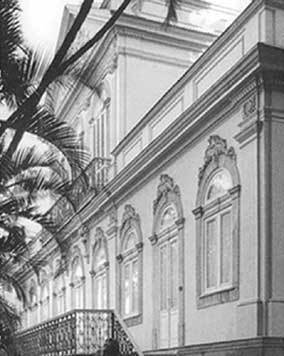 Casa de Rui Barbosa, Rio de Janeiro Casa de Rui Barbosa, Rio de Janeiro |
Accommodations in Rio de Janeiro have been blocked for AIZEN conference participants at the ROYALTY COPACABANA HOTEL (Rua Tonelero, 154, Copacabana/ Tel. 2548-5699). This hotel is located on a busy street in a lively quarter of Rio. There are many restaurants and bars as you go toward the famous Copacabana beach, only a few blocks away. Be sure to leave most of your money and valuables in the safety deposit box provided in the hotel rooms when you walk around in Copacabana and please take a taxi, the Metro, or a bus if you visit another part of the city, rather than attempt to cross from one quarter to another on foot. The hotel has 143 rooms with air-conditioning, sound-proof windows, bar, restaurant, pool, sauna, gymnasium, and pay-parking, including a garage complete with mechanic. The special AIZEN price for a room is $40.00 US (R120.00) per night. All credit cards are accepted. In order to be sure that you profit from the special AIZEN rates, you should contact the Cafferena Agência de Viagens e Turismo LTDA (Av. Marechal Câmara, 160/ sala 1201 – Centro – Rio de Janeiro – RJ), by Tel: (55) 21 2532 1483; Fax: (55) 21 2240 8322; or email: cafferena@alternex.com.br.
Looking ahead, the next AIZEN conference will take place in the spring of 2006 in New York City, USA, May 4-5. This will be a very specialized AIZEN conference, entitled “International AIZEN Conference on Realism and Naturalism in Film Studies,” and jointly sponsored by the AIZEN and the City University of New York (CUNY) Graduate Center. Since film has always been emphasized by our association, this event will give our association the opportunity to explore naturalist and realist cinema in depth and invite the best-known critics in this area. Specialists in film studies who have a research interest connected to Zola, realism, and/or naturalism, as currents in cinematographic representation, are encouraged to submit abstracts to Robert Singer, the Vice-President of the AIZEN, by June 15, 2005. For further details on registration, submissions, and hotel reservations, please consult the AIZEN web site: /.
We have good news to report about many of our members. Congratulations go to Holly Woodson Waddell, who successfully defended her doctoral dissertation, entitled “The Mother, Modernity, and Myth: Émile Zola’s La Curée, L’Argent, Au Bonheur des Dames, and Nana,” at Northwestern University, Chicago (USA), in 2003, under the direction of Professor Sylvie Romanowski. This year, she will be teaching full-time at the University of Washington. Also in 2003, Gaël Bellalou successfully defended her doctoral thesis, entitled “Regards sur la femme dans l’oeuvre d’Émile Zola: ses représentations du livre à l’écran,” at the University of Bar-Ilan, in Jerusalem (Israel), under the direction of Judith Kauffmann, and we congratulate her as well. She will be teaching at the University of Bar-Ilan next year. Hats off to Jean-Sebastien Macke, who also completed his doctorate in 2003, with a thesis entitled “Émile Zola-Alfred Bruneau. Pour un théâtre lyrique naturaliste” at the Université de Reims Champagne-Ardenne (France), under the direction of Alain Pagès. He will be teaching for a private correspondence school in France and carrying out research related to Zola, naturalism, and music. Congratulations go to Margot Versteeg, who has a new position as Assistant Professor of Spanish, at the University of Kansas, and to Isabelle Schaffner, who is now a maître de conférences at the École Polytechnique de Paris.
Other members have published recently. Tony Williams has produced three new books in the last two years! His work on George Romero, entitled The Cinema of George A. Romero: Knight of the Living Dead, came out in 2003 (Wallflower Press/Columbia University Press), filling a major gap in horror-film criticism, since there is no other in-depth study on this filmmaker. Additionally, Tony Williams has two volumes coming out in 2004: Body and Soul: The Cinematic Vision of Robert Aldrich (Scarecrow Press) and International Horrors (Wayne State University Press), this latter a collection of essays co-edited with Steven Jay Schneider.
Catherine Dousteyssier-Khoze’s book, entitled Émile Zola et la littérature naturaliste en parodies, has come out with Eurédit, in Paris. She is also organizing a conference on “Parodie” at Durham University, in England, together with Floriane Place-Verghnes. This event will take place on March 24 and 25, 2005. For more information, please contact her at: Catherine.Dousteyssier@durham.ac.uk
This year Robert Ziegler has published a new book entitled The Mirror of Divinity The World and Creation in J. K. Huysmans (Newark, University of Delaware Press). Elizabeth Emery has a collection of essays, entitled Medieval Saints in Late Nineteenth Century French Culture coming out this year with McFarland. The volume was co-edited by Laurie Postlewate. Elizabeth Emery wrote the introduction, in addition to contributing an article on Le Rêve. The collection includes articles by other members of the AIZEN, including Carolyn Snipes-Hoyt, Madhuri Mukherje, Barbara Larson, and C.J.T. Talar.
Anna Gural-Migdal and Robert Singer have also co-edited a collection of essays on film adaptations of Zola's work, with a foreword by Brigitte Émile-Zola. This volume, entitled Zola and Film: Essays on the Art of Adaptation, will come out by the end of the year with McFarland as well. This volume comprises approximately fifteen articles, many by members of the AIZEN, including Tony Williams, Russell Cousins, Katherine Golsan, Klaus Peter Walter, Laurent Marie, Elisabeth Christine Muelsch, Jennifer K. Wolter, Heather Howard, Anna Gural-Migdal, and Robert Singer. Anna Gural-Migdal’s book Writing the Feminine in Zola and Naturalist Fiction/L’Écriture du Féminin chez Zola et dans la fiction naturaliste, has sold out and is going into its second edition. Those who failed to obtain a copy of the first edition will be able to download an order form on the AIZEN web site.
Brigitte Émile-Zola and Alain Pagès have produced an edition of Zola correspondence, entitled Lettres à Jeanne Rozerot 1892-1902 (Gallimard, 2004). This volume of 390 pages makes public for the first time Zola’s missives to the mother of his children and includes many unpublished photographs. Colette Becker and Véronique Lavieille, have come out with an edition of Zola’s notes for his novels, entitled La Fabrique des Rougon-Macquart. Édition des dossiers préparatoires (Champion, Textes de littérature moderne et contemporaine).
Congratulations go to Jeanne Campbell Reesman, who has worked with her colleagues at the University of Texas at San Antonio for many years to design and launch a doctoral program in English with an emphasis in cross-cultural studies. She asks that we make our students aware of this program, in which the study of English and American literature, criticism, and theory may serve either as a major or minor research and teaching area. Latino/Latina studies would be the other area of specialization. Since many cultures intersect in San Antonio, but especially those using English and Spanish, this setting provides an ideal location for the preparation of researchers and teachers in this field. AIZEN member Debbie Lopez will also be involved in the new program. Our sincere thanks go to Denise Merkle, Jennifer Wolter, and Melanie Giraud who have taken out lifetime memberships in the AIZEN.
Volume XIX of Excavatio is ready to be printed. It contains 28 articles, classified as follows: Networks of Energy in the Rougon-Macquart; Zola: Translation, Adaptation, and Censorship; Naturalist Crossroads and Junctures; Social Hierarchy and the Margins; and Comparative Reflections on Naturalism. A special issue of Excavatio on Brazil will be published after the conference, with a selection of papers that highlights the connections between Émile Zola and that country. Sales of Excavatio have increased and its circulation has become even more international than before, as still other university libraries take out subscriptions to Excavatio, such as the University of Texas at San Antonio (USA), the University of Macerata (Italy), and the Université du Québec à Montréal (Canada). The composition of the Excavatio editorial team has changed again, since Gust Olson left for a new position in Wisconsin, USA. Our new Editorial Assistant is Alexandra Miekus, from the University of Alberta. We welcome her on board and wish her the best in this new undertaking. The efforts of the entire editorial team are greatly appreciated. Thank you one and all.
Thirteen years of existence now for the AIZEN! We have accomplished many of our goals and won several major victories, of which the most important is having promoted Zola and naturalist studies on a world scale. The conference in San Antonio was intended to bring us closer to the Latin world. The conference in Rio de Janeiro is a concrete manifestation of our desire to transport the AIZEN to South America. In coming years, we would like to immerse you in Hispanic culture and naturalism, through the organization of conferences in places such as Mexico, Puerto Rico, Argentina, and Chile.
We can congratulate ourselves as well for having made known a number of talented young researchers in the area of naturalist studies and contributed to their university careers. During the banquet at the former Ursuline convent in San Antonio, we were pleased to recognize, among those present, former recipients of the AIZEN Award who had become professors in excellent universities, yet remain faithful to our association and continue to contribute to the intellectual quality of our conferences through their participation. We hope to pursue this goal of continual renewal of knowledge and blood, by recruiting the best researchers world-wide, of all generations and nationalities.
Finally, another way of discovering new talent or to renew our numbers will be to organize conferences on precise topics, such as the one to take place in New York in 2006, which will allow us to place researchers in film or film studies on front stage. The 2008 AIZEN Conference will have as its theme “Zola and Provence,” which will enable us to return to Zola as source, his childhood and his writings as the master of naturalism; that is, to move from the exploration of the international repercussions of this writer and concentrate on his regional dimension.
As we await the pleasure of meeting you in the mythical city of Rio de Janeiro, we wish you an excellent summer!
Anna Gural-Migdal, University of Alberta, and Carolyn Snipes-Hoyt, Pacific Union College
the 23rd of May, 2004
12th AIZEN International Conference Portfolio, University of Texas at San Antonio, USA, October 9-11, 2003
Dear Professor Gural-Migdal,
Although I told you in San Antonio I was concerned that both funding and scheduling would preclude my participation in the Rio conference, I have since been able to resolve both issues. This resolution was in large part due to the wonderful experience of the San Antonio conference, where I met and had many lovely and very useful conversations with colleagues from other literatures and, in particular, the medical profession. AIZEN provides a forum for engaging and rigorous interdisciplinary explorations not easily found elsewhere!
Reciba un fuerte abrazo de
--Erika Sutherland, Muhlenberg College, USA
Chère Anna,
Je tenais d’abord à te dire combien j’avais eu plaisir à retrouver mes collègues de l’AIZEN à San Antonio le mois dernier et combien j’avais apprécié, comme toujours, ton énergie et ta bonne humeur! Comme à l’habitude, le colloque était très réussi!
Je t’embrasse en te souhaitant bonne continuation avec ta santé,
--Marie-Sophie Armstrong, Lehigh University, USA
Dear Anna,
Thanks for organizing another great AIZEN meeting in San Antonio. I had a wonderful time! Hope you are doing well, and enjoying some rest, if that’s possible, from your busy schedule!
All the best,
--Göran Blix, Princeton University, USA
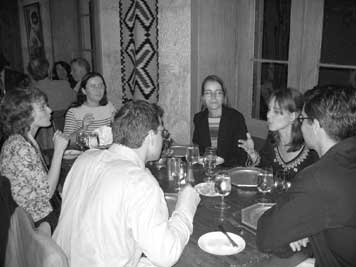 The Next Generation of Zola Scholars The Next Generation of Zola Scholars |
Hi Carolyn,
Yes, it was great being on a panel together on Le Rêve and I really enjoyed the experience. It hadn’t occurred to me to think of Le Rêve as a female Gothic novel, and that was an intriguing perspective. Hope to see you at another AIZEN soon; and good luck settling down in California.
All the best,
--Göran Blix, Princeton University, USA
Chère Anna,
Merci à vous, Anna, et à toute votre équipe (Carolyn, Robert, Elizabeth) pour encore un autre colloque merveilleusement bien réussi. La variété des approches ne fait que confirmer que Zola est toujours vivant parmi nous. J’ai beaucoup apprécié d’avoir eu l’occasion d’entendre Jacques Dubois.
Pour tout, un très grand merci.
--Jurate Kaminskas, Queens University, Canada
Chère Anna,
Un grand merci de votre chaleureux accueil à San Antonio et surtout à l’AIZEN. J’y ai vécu des moments très stimulants et instructifs qui resteront longtemps gravés dans ma mémoire. Je vous félicite d’un congrès tout à fait réussi et je vous remercie de me tenir au courant des activités de l’AIZEN auxquelles j’espère participer à l’avenir.
Encore, chère Anna, Madame la présidente, merci.
--Toby Gelfand, Université d’Ottawa, Canada
Dear Anna,
Thank you so much for the marvellous days I could spent in San Antonio. It was a pleasure seeing you again. My visit was an event I will long remember with great appreciation. Please accept my congratulations for helping to make the XIIth AIZEN conference such a success!
Many thanks to you and everyone.
--Wojciech Tomasik, University of Bydgoszcz, Poland
Bonjour Anna,
J’espère que ton retour s’est bien passé. Avant tout merci pour ce colloque à l’organisation et au déroulement impeccables. Je sais que tu as l’habitude mais c’est tout de même un sacré travail!
Amicalement,
--Pierre Morel, Agence universitaire de la Francophonie-Montréal, Canada
Chère Anna,
Mes félicitations et remerciements pour la conférence qui s’est si bien passée. J’en suis très content et je sais que les autres le sont aussi.
Bien amicalement,
--Kristof Haavik, University of Bostwana, Bostwana
Dear Professor Anna,
What a wonderful meeting! Comme l’a dit Mademoiselle Aurélie de Saarbruck, “Un vrai fan club de Zola!”, avec des gens qui aiment ce romancier et le naturalisme. I am proud to be among them and happy to have contributed to this meeting.
Bien à vous et encore une fois, grand merci.
--Robert S. April, Mount Sinai School of Medicine, USA
Chère Anna,
Je vous remercie très sincèrement pour avoir organisé ce colloque dont j’ai apprécié l’organisation et la qualité des communications. Je tiens à vous féliciter car l’accueil était des plus agréables. Je suis heureuse d’avoir fait votre connaissance et j’espère vous revoir à une prochaine conférence AIZEN. Cette expérience à San Antonio a été pour moi très enrichissante.
Bien cordialement,
--Sandrine Rabosseau, Université de Paris III-Sorbonne Nouvelle, France
Chère Prof. Snipes-Hoyt,
Cela a été un vrai plaisir de vous revoir à San Antonio. La conférence était excellente. Merci infiniment.
Bien amicalement,
--Gilbert Darbouze, Bloomsburg University, USA
Dear Anna,
Thanks again for a wonderful conference. I look forward to the AIZEN all year and it never lets me down. It is a stimulating, warm, and exciting environment not just to discuss Émile Zola and Naturalism (though that is of course what brings us together with such passion) but also to see old friends and to welcome new members. In essence, the AIZEN is the perfect example of what a scholarly meeting of minds should be.
Take care.
Yours,
--Holly Woodson Waddell, Northwestern University, USA
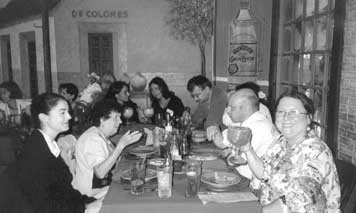 Margaritas, por favor! Margaritas, por favor! |
Chère Anna,
Mes plus vives félicitations, Anna, pour un colloque bien réussi. La combinaison de stimulation intellectuelle et de camaraderie était bien agréable. Toi et ton équipe réussissez à attirer des conférenciers très sympas!
Bien cordialement,
--Denise Merkle, Université de Moncton, Canada
Chère Professeur Gural-Migdal,
Je tenais à vous remercier, vous et toute votre équipe, pour l’excellente organisation de la conférence sur Zola à San Antonio. Les sessions étaient très enrichissantes et le tout une expérience inoubliable.
Meilleurs voeux pour un bel automne!
--Noémie Isabelle Parrat, University of Pittsburgh, USA
Professor Gural-Migdal,
I greatly enjoyed the AIZEN conference in San Antonio, and I acquired important new insights into Émile Zola and Naturalism from listening to the papers of the other presenters. Thank you also for allowing me to co-chair a session with Professor Pilar Rotella, with whom I think I formed a valuable new friendship. Thank you once again for the hospitality you showed to all of us who presented at the San Antonio conference.
--Edward Lasseigne, Ohio State University, USA
Dear Professor Gural-Migdal,
I just wanted to thank you for the wonderful hospitality and the chance you gave me and my friend Anna to participate at the conference. It gave us such a boost of confidence and increased our willingness to further pursue the research on Zola and his work. We could had never imagined that the atmosphere would be so friendly and relaxed. Most importantly, we had a chance to hear so many wonderful research papers and meet many knowledgeable Zola scholars. What a treat!
I am also very thankful to Dr. Emery. I feel very privileged and lucky to know her and to have a chance to “feed” on her inexhaustible energy. Again, congratulations on such a successful conference and thank you for this wonderful experience. I am sure that we will see each other at one of the future AIZEN conferences.
All the best,
--Gorica Hadzic, Montclair State University, USA
Chère Anna,
De retour en France et avant de repartir dans le pays de Germinal (le Nord de la France) je tenais à vous remercier pour l’accueil que vous nous avez réservé au colloque de l’AIZEN. J’ai pris beaucoup de plaisir, lors de ces trois journées, à rencontrer les différents intervenants et à échanger, avec eux, sur notre passion commune de la littérature et d’Émile Zola. Ce fut une expérience enrichissante, vécue sur le mode de la détente et de l’amitié. Donc, merci pour tout cela et, je l’espère, à très bientôt.
--Jean-Sébastien Macke, Université de Reims, France
Hi Anna:
I had a wonderful time in San Antonio. It was a very successful and informative conference. The events were beautiful, and all the people seemed to really enjoy themselves. Congratulations! I am sending you some of the pictures I took. Hope you are well, and I look forward to seeing you again soon.
--Pamela Wilson, California State University, USA
Dear Anna,
As usual, the 12th AIZEN conference was excellent, both in academic (good papers, interesting presentations) and human (nice people, friendly atmosphere) terms. I want to congratulate and thank all the organizers and you, in particular, for a job well done. Thank you for your patience and, once again, for the great experience in San Antonio.
Best,
--Pilar Rotella, Chapman University, USA
Dear Anna,
Thank you so much for organizing the wonderful AIZEN conference in San Antonio. It was so nice to meet colleagues from last year’s conference and to get to know new colleagues who work on American and Mexican-American Naturalism. This was such an enriching experience especially for someone who teaches in Texas. There were so many panels I enjoyed including Robert Singer’s great film presentations. After watching THE WIND, I think I got some of my colleagues in the English Department interested in teaching Dorothy Scarborough’s novel again. Again thank you.
Best wishes,
--Elisabeth-Christine Muelsch, Angelo State University, USA
Chère Anna,
J’ai bien regretté de manquer hier ton amical coup de fil. Michou t’a donné des nouvelles. Je garde du colloque de San Antonio le plus vif souvenir. Comme je te l’ai dit, j’ai été frappé par la qualité des communications mais tout spécialement par celles qui provenaient des jeunes chercheurs de diverses origines. Vraiment c’est magnifique de donner ainsi à la “classe montante” la possibilité de donner son travail à voir. Puis il y a eu des intermèdes stimulants comme celui consacré à Charcot et à l’hystérie. Enfin je n’oublie pas ton accueil bienveillant et dynamique, ton souci de tout et de chacun, l’organisation si bien huilée. Bravo vraiment.
Amitiés de nous deux,
--Jacques Dubois, Université de Liège, Belgium
Chère Carolyn,
Depuis mon retour du Texas, je songe à t’écrire quelques mots... Mais la vie nous reprend — avec ses exigences quotidiennes — et nous happe... J’ose croire, par ailleurs, que tu n’as pas souffert du désastre incendiaire de la Simi Valley, et que ton enseignement te plaît... J’ai été heureuse de te revoir... et je te félicite pour ta très grande disponibilité à l’AIZEN. Au plaisir de te retrouver dans quelques mois... peut-être!
Amicalement,
--Hélène Poiré, Université Laval, Canada
Chère Anna,
Belle performance que ce 12e Colloque de l’AIZEN… autant sur le plan de la richesse thématique que sur celui de l’audace des participants – évoquant chacun/-une à leur manière leur fusion avec Zola : témoin et partisan émérite d’une société mutante qu’il s’affaira à défendre tambour battant. La couleur locale texane, par ailleurs, a supplanté l’absence de rayonnement de l’astre du jour. Par leur efficacité discrète, bref, leur bonhomie, les membres actifs de l’UTSA ont su créer un moment inoubliable. Mille mercis à tout le comité organisateur — à toi, Anna, en particulier, ainsi qu’à Carolyn, Robert et Elizabeth. Au plaisir de se revoir tous... très bientôt !
--Hélène Poiré, Université Laval, Canada
Ma très chère Anna,
Remplie de sensations et d’images nouvelles, d’idées qui ont comblé les vides intérieurs, de réflexions sur une grosse partie des communications, alimentée par votre chaleur, votre attention, votre manière de faire, d’être et de dire, je continue à vivre et à revivre les moments enrichissants et qui ne se répètent jamais, jours heureux passés dans un pays tout à fait particulier et très différent des pays de l’Europe. Je vous remercie pour l’organisation exemplaire du colloque, pour le travail immense qu’il a fallu effectuer pour que les scientifiques réunis des différents coins du monde puissent faire des échanges d’idées, de visions car c’est l’oralité qui met en marche autrement notre pensée. La gentillesse et la compétence de vos adorables collaboratrices ont incontestablement contribué au succès du colloque qui a donné un goût particulier de travailler sur l’oeuvre d’Émile Zola. Je vous prie de transmettre mes remerciements les plus sincères et mes salutations à tous nos collègues.
Je vous embrasse fort,
--Anna Bondarenco, State University of the Republic of Moldova, Moldova
Ma chère Anna,
Tout d’abord, je voulais te remercier encore pour le colloque de San Antonio. Il a été vraiment une réussite, organisé dans une ambiance agréable et chaleureuse. Tout cela en grande partie grâce à toi. Aussi, le retour a été difficile et se replonger dans le bain de la routine quotidienne relevait d’une mission quasi impossible! J’espère que ton retour au Canada s’est bien passé ainsi que ta reprise. Encore mille mercis pour ce colloque inoubliable,
A bientôt,
Amitiés de Jérusalem,
--Gaël Bellallou, University Bar-Ilan, Israël
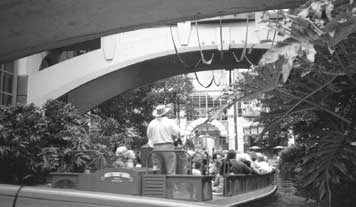 San Antonio River Barge Narrated Tour San Antonio River Barge Narrated Tour |
Chère Anna,
Assise confortablement dans l’avion j’exerce l’art zen: il faut absolument que cela passe... la nostalgie qui m’envahit après AIZEN au Texas! Pas évident de dompter mon appétit des récits zoliens qui augmente... Pas évident d’organiser tant de beauté mémorisée: le San Antonio de l’eau et des “Margaritas”, La fête des paroles ès lettres et de tout autre rite: les Mariachis, les dîners extraordinaires, les organisateurs et conférenciers hors pair. Les sornettes, le sérieux, les rires, “The Wind” silencieux, les médecins, le prêtre et... les chauve-souris! Ma mémoire éclate, elle n’en peut plus de tant de beauté mémorisée et j’en suis heureuse! A toi, Anna, et à vous tous, “Texans” pour un moment ou pour plus longtemps: mes remerciements, mes remerciements!!!
--Dorota Walczak-Delanois, Université Libre de Bruxelles, Belgium
Chère Anna,
La reprise a été dure, après une telle coupure! Mais que de souvenirs divers et surtout un colloque très riche en communications et contacts humains. Merci pour tout cela! Les photos suivront très prochainement.
Cordial souvenir,
--Chantal Morel, Institut français du Royaume-Uni, England
Chère Anna,
Permettez-moi de vous remercier de ce colloque magnifique, rendu possible par votre énergie créatrice. Quel plaisir de passer ces jours en votre compagnie, quelle merveilleuse occasion d’écouter et de rencontrer tous ces chercheurs et ces chercheuses exceptionnels — qui m’ont tant apporté ! La richesse et la qualité des interventions m’ont permis d’élargir mon horizon et de développer plusieurs aspects de ma recherche. Votre colloque, par son atmosphère chaleureuse et conviviale est décidément un lieu unique pour les échanges intellectuels: on aimerait y retourner souvent! J’ai été très heureuse, en outre, de faire la connaissance de Carolyn, d’Elizabeth et de Robert; je les remercie très chaleureusement de l’accueil amical qu’ils m’ont réservé, et je félicite tous les organisateurs pour cette belle réussite. En vous remerciant de tout coeur pour m’avoir permis de participer à cet événement, je me réjouis à l’idée de vous revoir à une prochaine occasion,
Très cordialement à vous,
--Marion Geiger, The Johns Hopkins University, USA
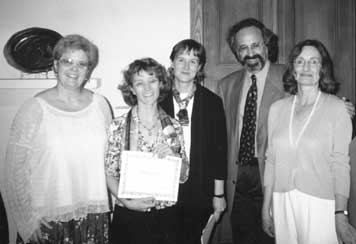 2003 Schor/Cahm Award Winner Marion Geiger with the AIZEN Organizational Committee 2003 Schor/Cahm Award Winner Marion Geiger with the AIZEN Organizational Committee |
Chère Anna,
Je tenais à te remercier pour avoir organisé ce merveilleux colloque à San Antonio. J’ai apprécié la grande qualité des interventions et les discussions stimulantes entre collègues exerçant dans différents pays. Mon seul regret est de n’avoir pas pu participer au banquet car j’ai dû écourter mon séjour. Au plaisir de te revoir très prochainement.
Amitiés,
--Isabelle Schaffner, Columbia University in Paris, France
Chère Madame Gural-Migdal,
Je vous suis extrêmement reconnaissante d’avoir bien voulu m’accueillir parmi vous à San Antonio. Ce fut un plaisir.
Veuillez agréer l’expression de mes sincères salutations,
--Mélanie Giraud, The Johns Hopkins University, USA
Chère Anna,
Je veux te remercier pour l’organisation du colloque, pour l’énergie positive que toi et ton équipe y avez investie et pour l’efficacité et le professionnalisme dont vous avez fait preuve. Te dire aussi que grâce à toi et à l’AIZEN, j’ai eu, à San Antonio, pour la première fois, le sentiment d’appartenir à une communauté zolienne internationale. Ce fut un sentiment très agréable, constructif et encourageant pour mes recherches.
Mes salutations les plus cordiales, et avec mes meilleurs souvenirs,
--Aurélie Barjonet, University of the Saarland, Germany
Chère Professeur Gural-Migdal,
Ce fut un plaisir de faire votre connaissance à San Antonio en octobre. La conférence était remarquablement organisée et notre session s’est particulièrement bien déroulée, je trouve.
Je vous prie de croire, professeur, à l’expression de ma considération la plus respectueuse.
--Jean-Marc Braem, Lebanon Valley College, USA
Chère Madame Gural-Migdal,
Je trouve enfin un petit moment pour vous faire ce mot. D’abord, je vous félicite pour la dernière conférence, ainsi que tous ceux qui ont rendu cet événement possible; j’ai rencontré de vieilles connaissances, je m’en suis fait de nouvelles. J’ai aussi écouté plusieurs communications, toutes plus intéressantes les unes que les autres. J’ai particulièrement apprécié les déjeuners et dîners dans cette belle ville de San Antonio. Cette conférence fut une véritable réussite. Bravo!! Bonne fin de semestre.
Cordialement,
--Christian Mbarga, St. Thomas University, Canada
Chère Anna,
I wish you the very best for the new year and wish to express my deepest thanks for making me feel so welcome at the AIZEN conference in San Antonio. The conference was a smashing success!
Best wishes,
--Jean-Marie Dauplaise, University of Wisconsin-Stout, USA
Chère Anna,
Je vous remercie à nouveau de m’avoir donné l’occasion de participer au colloque à San Antonio dont je garderai toujours de très beaux souvenirs! Je n’oublierai jamais l’ambiance chaleureuse, l’intense dialogue intellectuel, les Zoliens que j’ai rencontrés au Texas. C’est à ce colloque, si riche et si passionnant, que je dois sans doute l’inspiration de continuer à poursuivre les recherches sur Zola. Enfin, je dois exprimer mon admiration devant le travail colossal que vous avez fait, votre passion et votre énergie. Mes remerciements vont aussi à tout le comité d’organisation. Cela me fera plaisir de vous revoir à Rio de Janeiro.
Je vous envoie mes bien amicales pensées,
--Agnieszka Tworek, Yale University, USA
Chère Anna,
Je n’ai pas encore eu l’occasion de te remercier pour un colloque formidable à San Antonio (malgré la pluie!). Encore une fois, j’ai trouvé l’ensemble des communications fort intéressant et l’ambiance
très agréable. Merci!
Bien amicalement,
--Janice Best, Acadia University, Canada
Dear Professor Gural-Migdal
Thank you for making the AIZEN conference such a wonderful experience for all of us. A Happy New Year!
Respectfully,
--Laura Ioana Pondea, Ohio State University, USA
Greetings, Anna
Since I enjoyed San Antonio so much, I am suffering extra pangs about not being able to submit a proposal for Rio. I’m predicting that you are going to love it there and that the conference is going to be one of the best ever. Along with wishing you a heartfelt happy new year, I get to wish you a thoroughly timely one too.
Best,
--Steve Amarnick, Kingsborough Community College, CUNY, USA